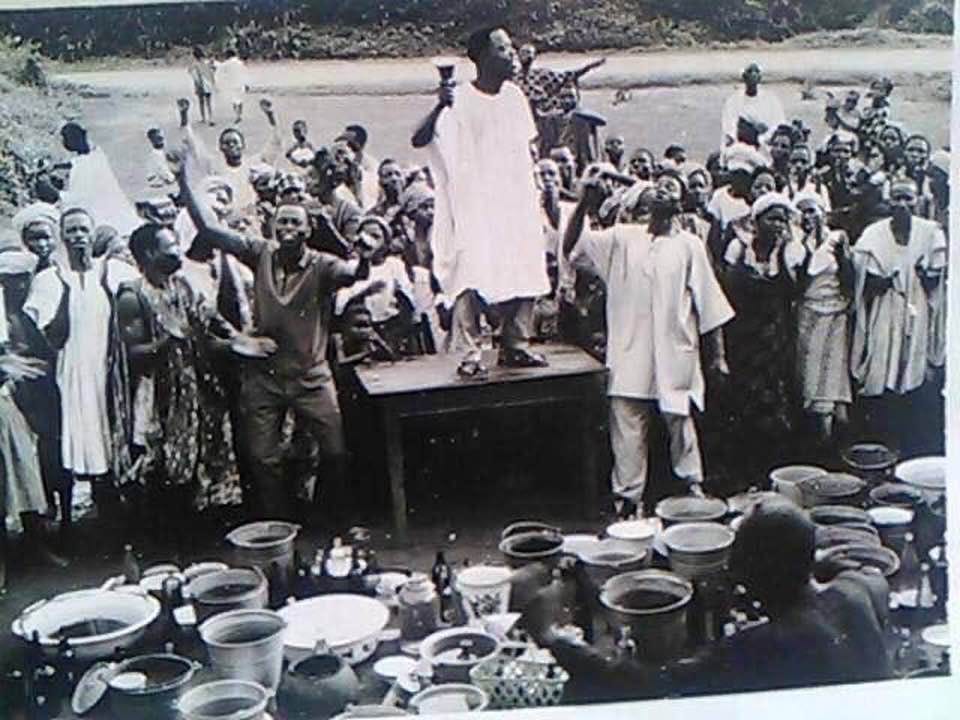Early Life and Background
Apostle Joseph Ayo Babalola was born on April 25, 1904, in Odo-Owa, Ilofa, Kwara State, Nigeria. He was the first child of Pa David Rotimi and Madam Martha Talabi Rotimi. Raised in an Anglican Christian family, Babalola received his early education in a mission school before training as a blacksmith. Later, he worked as a steamroller operator with the Public Works Department (PWD), a career path that was abruptly interrupted by his divine calling.
Divine Calling and Supernatural Encounter

Babalola’s calling into ministry was dramatic and supernatural. In 1928, while working in Ilesha, Osun State, he experienced a divine vision where he saw a large river with countless people perishing in it. He also heard a loud voice calling him to abandon his job and embark on an evangelical mission. After several encounters with this voice, he succumbed to the call and resigned from his job.
Following this supernatural experience, Babalola spent days in prayer and fasting to seek divine direction. According to historical accounts, during his period of spiritual preparation, he was empowered with spiritual gifts, including the ability to heal the sick, perform miracles, and prophesy.
Ministry and the 1930 Revival
Babalola’s ministry gained significant recognition in 1930 during the great revival at Oke Ooye, Ilesha. This revival was one of the most remarkable spiritual awakenings in Nigeria’s history, attracting thousands of people who witnessed miraculous healings and deliverances. The sick were healed, the lame walked, the blind received their sight, and the demon-possessed were set free.
This unprecedented move of God led to the rapid growth of the Faith Tabernacle movement in Nigeria. However, due to doctrinal differences with the parent body in Philadelphia, USA, the movement in Nigeria severed ties and eventually evolved into the Christ Apostolic Church (CAC) in 1941, with Babalola as a key figure.
Core Teachings and Doctrines
Babalola’s teachings centered around fundamental Christian doctrines, emphasizing:
- The Power of Prayer and Fasting – He was known to spend hours, sometimes days, in intense prayer and fasting. His personal lifestyle reflected deep commitment and discipline in spiritual matters.
- Divine Healing and Deliverance – He preached that faith in Jesus Christ brings divine healing and deliverance from demonic oppression.
- Holiness and Righteous Living – Babalola emphasized a life of holiness, consecration, and total obedience to God.
- Evangelism and Missions – His passion for soul-winning led him to travel extensively across Nigeria, spreading the gospel.
Challenges and Persecution
As with many revivalists, Babalola faced significant opposition from traditionalists, occult groups, and even colonial authorities who were skeptical of his growing influence. He was arrested multiple times for preaching without permits and for his confrontations with traditional religious practices. Despite these challenges, his faith remained unwavering, and his ministry continued to flourish.
The Expansion of His Ministry
Babalola’s influence extended beyond the Yoruba-speaking regions to other parts of Nigeria. He established several churches and missionary stations, trained evangelists, and mentored young ministers. Under his leadership, the Christ Apostolic Church (CAC) became one of the largest indigenous Pentecostal denominations in Nigeria.
His Death and Legacy
On July 26, 1959, Apostle Joseph Ayo Babalola passed away at the age of 55. Despite his relatively short lifespan, his impact on Nigerian Christianity remains profound. Today, the Christ Apostolic Church continues to grow, with millions of adherents worldwide. His teachings on prayer, fasting, and holiness continue to influence many believers and ministries across Africa and beyond.
Conclusion
Apostle Joseph Ayo Babalola was a man of deep faith, anointed power, and an unshakable commitment to the gospel. His legacy of revival, miracles, and evangelism has left an indelible mark on the Pentecostal movement in Nigeria. His life story continues to inspire generations of Christians to pursue a life of consecration, prayer, and unwavering faith in God.


